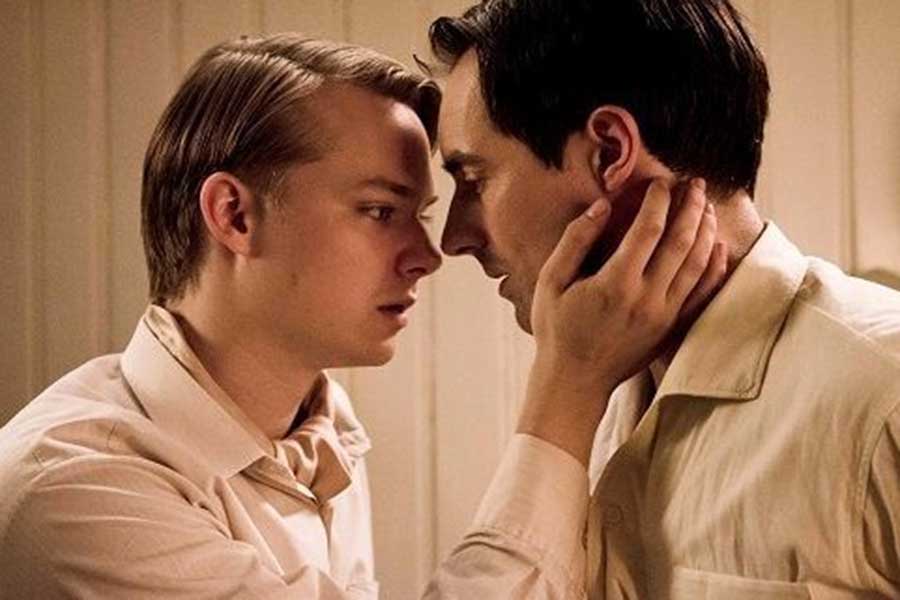“The Circle,” which is Switzerland’s submission for the Best Foreign-Language Film Oscar, provides a fascinating glimpse into gay life in 1950s Zurich. The film, directed and co-written by Stefan Haupt, alternates between dramatic episodes and documentary interviews. The hybrid approach effectively chronicles the lives of various men involved in a secret homophile society called “The Circle.”
The film will only show twice, 4:30 and 7:30 p.m. Dec. 14 at PhilaMOCA, 531 North 12th St.
In the film, Rolf (Stefan Witschi) leads the organization, which was founded in 1942 by actor Karl Maier. The 2,000 international members receive the title publication, and are invited to various balls where transvestite singers like Robi Rapp (Sven Schelker) perform. Haupt shows how Ernst Ostertag (Matthias Hungerbühler), a schoolteacher, joined The Circle and fell in love with Robi.
Interspersed between these scenes is footage of the real-life Robi and Ernst, an elderly couple who still live together in Zurich. The documentary scenes recount how the couple met and negotiated their relationship in the restrictive era. Their romance blossomed during the time of Paragraph 175, which criminalized homosexuality in Germany. While homosexuality wasn’t illegal in Switzerland, being openly gay was not entirely “safe” either. As the film shows, police raids at clubs and arrests were not uncommon.
“The Circle” makes its salient points about the dangers of being out, but also for the need of gay men to be true to their natures, assert their identities and “cultivate friendship and love in freedom.” That Ernst decides to join The Circle before he is officially confirmed as a teacher at his school (which ensures him job security) is a risk he feels is worth taking.
His relationship with Robi is a bit trickier. While the men first meet when Ernst is transfixed by Robi’s performance in drag, he does not believe the singer is a man. However, the men do not truly connect until Ernst visits Robi, a hair stylist, at his work. The couple soon start spending their nights together.
Their relationship, while affectionate, has some glitches. Whereas Robi is open to his mother, Erika (Marianne Sägebrecht), Ernst is closeted to his parents. In the interviews, the real-life Robi and Ernst discuss how long it took for Ernst to introduce him to his parents, a scene recreated in the film. Ernst’s sister is also interviewed in the documentary portion, and she explains how the relationship between the men was understood, if not discussed. Ernst’s sister also discloses that her brother fabricated stories about women he was dating to maintain a double life. She explains Ernst came out at age 70.
“The Circle” benefits from the mix of documentary and drama not only to emphasize the importance of stories like Ernst and Robi’s, but also to show images of gay life during the late 1950s. The film includes a subplot about gay murders that were taking place in Zurich and how that put additional pressure on Rolf and the members of The Circle. The decision is made to maintain the sanctity of their organization and not start protesting ill treatment in the streets. A sequence recounting the murderer being brought to court and portrayed as a victim — while the gay murder victims are portrayed as criminals — underscores the second-class citizenship LGBT folks had in Zurich at the time, even with the country’s more liberal attitudes towards sexuality.
The film also introduces another important point when it presents an episode in which Ernst and Felix (Anatole Taubman) smuggle the banned magazine into Germany. While this episode has some mild tension as the men race across the border, a romantic dalliance the two friends have on their trip is underdeveloped.
Likewise, a storyline about Ernst’s boss, Mr. Sieber (Peter Jecklin), who has secret sexual trysts in toilets with rent boys, is critical to establishing the repressive culture at the time. While Ernst and Mr. Sieber silently accept each other’s (homo)sexuality, this episode plays out somewhat predictably and fails to have sufficient dramatic impact. It seems to be a case of Haupt trying to shoehorn as many plotlines as possible into 102 minutes.
The filmmaker does best presenting the factual material, such as how the magazine could publish artistic nudes but photographs could not feature naked genitals. In addition, pictures from the era of the real-life Robi in costume are interesting, especially in contrast to the handsomely mounted “recreation” scenes.
Despite its flaws, “The Circle” is an important film, and it provides a critical history lesson. The various degrees of acceptance and sexual expression are represented even if some of the characters are too-broadly portrayed. Haupt does make Ernst and Robi sympathetic in both the dramatic and documentary segments. When the film closes with the detail that these men were the first couple to enjoy same-sex marriage in Switzerland, “The Circle” is extremely gratifying.
